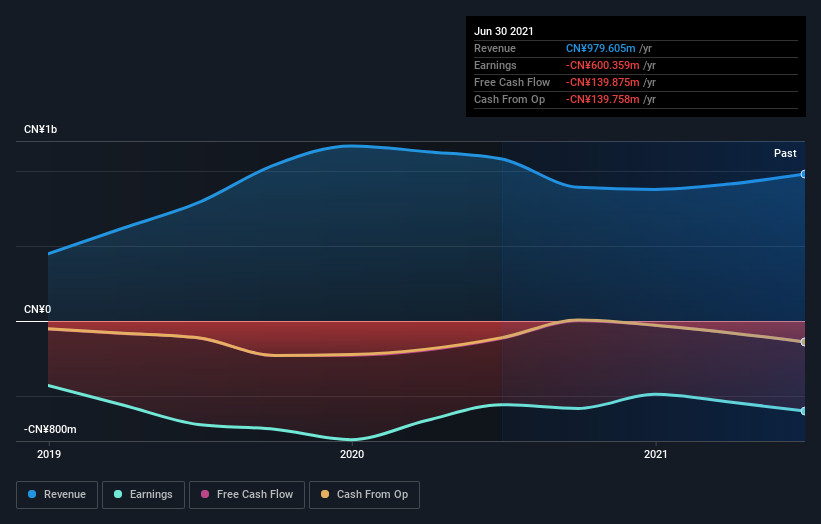Shareholders in Ucommune International (NASDAQ:UK) are in the red if they invested a year ago
It's not a secret that every investor will make bad investments, from time to time. But it would be foolish to simply accept every extremely large loss as an inevitable part of the game. It must have been painful to be a Ucommune International Ltd (NASDAQ:UK) shareholder over the last year, since the stock price plummeted 88% in that time. That'd be enough to make even the strongest stomachs churn. Ucommune International hasn't been listed for long, so although we're wary of recent listings that perform poorly, it may still prove itself with time. Unfortunately the share price momentum is still quite negative, with prices down 9.5% in thirty days. We really hope anyone holding through that price crash has a diversified portfolio. Even when you lose money, you don't have to lose the lesson.
It's worthwhile assessing if the company's economics have been moving in lockstep with these underwhelming shareholder returns, or if there is some disparity between the two. So let's do just that.
See our latest analysis for Ucommune International
Ucommune International isn't currently profitable, so most analysts would look to revenue growth to get an idea of how fast the underlying business is growing. Generally speaking, companies without profits are expected to grow revenue every year, and at a good clip. Some companies are willing to postpone profitability to grow revenue faster, but in that case one does expect good top-line growth.
Ucommune International's revenue didn't grow at all in the last year. In fact, it fell 9.2%. That looks pretty grim, at a glance. The market obviously agrees, since the share price tanked 88%. Holders should not lose the lesson: loss making companies should grow revenue. Of course, extreme share price falls can be an opportunity for those who are willing to really dig deeper to understand a high risk company like this.
You can see below how earnings and revenue have changed over time (discover the exact values by clicking on the image).
This free interactive report on Ucommune International's balance sheet strength is a great place to start, if you want to investigate the stock further.
A Different Perspective
While Ucommune International shareholders are down 88% for the year, the market itself is up 30%. However, keep in mind that even the best stocks will sometimes underperform the market over a twelve month period. With the stock down 5.9% over the last three months, the market doesn't seem to believe that the company has solved all its problems. Basically, most investors should be wary of buying into a poor-performing stock, unless the business itself has clearly improved. While it is well worth considering the different impacts that market conditions can have on the share price, there are other factors that are even more important. Like risks, for instance. Every company has them, and we've spotted 3 warning signs for Ucommune International (of which 1 is significant!) you should know about.
But note: Ucommune International may not be the best stock to buy. So take a peek at this free list of interesting companies with past earnings growth (and further growth forecast).
Please note, the market returns quoted in this article reflect the market weighted average returns of stocks that currently trade on US exchanges.
This article by Simply Wall St is general in nature. We provide commentary based on historical data and analyst forecasts only using an unbiased methodology and our articles are not intended to be financial advice. It does not constitute a recommendation to buy or sell any stock, and does not take account of your objectives, or your financial situation. We aim to bring you long-term focused analysis driven by fundamental data. Note that our analysis may not factor in the latest price-sensitive company announcements or qualitative material. Simply Wall St has no position in any stocks mentioned.
Have feedback on this article? Concerned about the content? Get in touch with us directly. Alternatively, email editorial-team (at) simplywallst.com.

 Yahoo Finance
Yahoo Finance 
